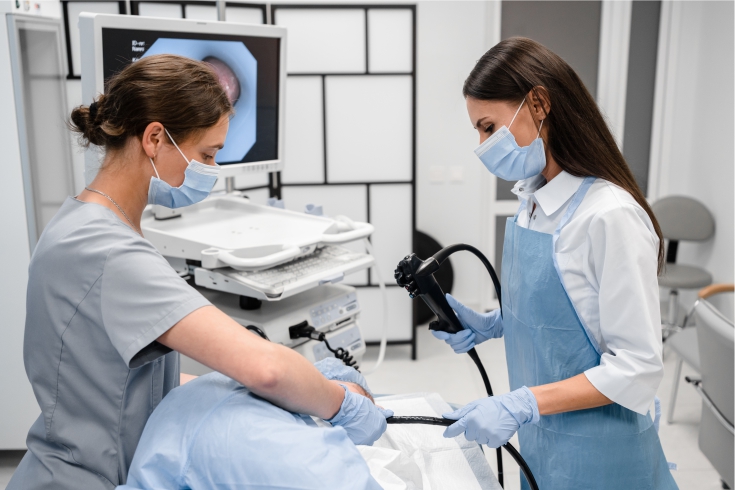
Colonoscopy
Colonoscopy is a medical procedure and aims to examine the inside of the large intestine. During this process, the doctor uses a colonoscope, a thin tube, to view the lining of the intestine. Colonoscopy is often used to diagnose early-stage cancers, polyps and inflammatory diseases.
Colonoscopy is performed without any discomfort and is usually a fairly short procedure. Regular screenings are especially recommended for individuals over 45, as the risk of colon cancer increases with age.
How to Perform a Colonoscopy?
Colonoscopy is usually performed in a hospital or clinic setting. Before the procedure, the patient is recommended a preparatory process to cleanse the intestines. This process involves using special medications to empty the patient’s intestines. During a colonoscopy procedure, the patient is usually sedated, i.e. the patient is put to sleep or slightly sedated by administering a relaxing drug.
During the procedure, the doctor goes into the large intestine with a thin tube (colonoscope). The colonoscope is equipped with a camera that allows a detailed view of the inside of the intestines. If the doctor spots any abnormalities, a biopsy can be collected from these areas or possible problems such as polyps can be removed.
Advantages of Colonoscopy
Colonoscopy enables early diagnosis of serious diseases such as colon cancer. Early diagnosis increases the chances of cure and allows diseases to be treated before they progress. In addition, polyps removed during colonoscopy are precancerous lesions and their removal may reduce the risk of cancer.
Colonoscopy also offers the following advantages:
- It may help in the diagnosis of inflammatory diseases of the large intestine (e.g. Crohn’s disease, ulcerative colitis).
- It helps to detect the source of bleeding in the intestines or digestive system problems.
- It enables the assessment of intestinal function and health.
Post Colonoscopy Period
You usually need to rest for a few hours after the colonoscopy. If sedation is applied, you may feel dizzy or drowsy for a while after the operation. Therefore, the person who undergoes the procedure is advised not to drive for a while until they recover.
There may be some mild abdominal pain, gas or bloating after the procedure, but this is usually temporary. If a polyp is removed during the procedure, your doctor will inform you about this.
When to Perform Colonoscopy?
Colonoscopy is generally recommended for people over the age of 50, but can be performed at an earlier age for people with a family history of colon cancer or other risk factors. If you are suffering from any digestive problems or if your doctor considers there is another cause, a colonoscopy may be recommended.
